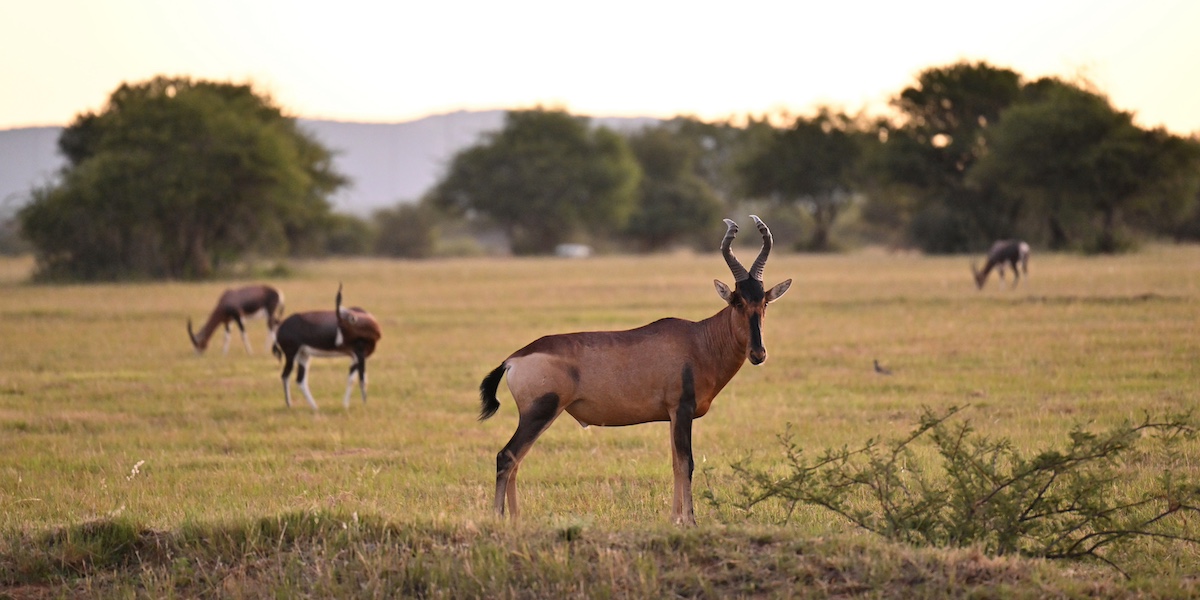Loading player
The Government of South Africa’s Department of Forestry, Fisheries and Environment (DFFE) recently presented a plan to stimulate the consumption of wild meat in the country, arguing that this would bring many benefits to the environment, people and the economy, but also to the wild animals themselves. To do this, he is also trying to pass new laws that make his consumption safer, even if it won’t be easy.
South Africa is one of the most biodiverse countries in the world and its wildlife population has grown significantly in recent decades. Today the country is inhabited by around 20 million wild animals, which in the mid-1960s numbered only half a million. This is also due to a 1991 law which, in addition to partially redistributing land after the end of apartheid, gave farmers the right to possess wild animals on their land to encourage their proliferation.
South Africa’s Environment Minister Barbara Creecy said this week that the DFFE was moving to regulate the bushmeat industry to ensure food safety and traceability, encourage the development of infrastructure such as slaughterhouses and promote the sale and the consumption of this meat both locally and abroad. In fact, at the moment only 10 percent of game meat is edible: the DFFE would like to reach85 percent by 2030.
According to the DFFE, increasing the consumption of wild animal meat to the detriment of farmed animal meat would have several positive aspects. First of all, thousands of wild animals, such as zebras and antelopes, are already killed every year because they reproduce quickly, and in some areas also have negative effects on the ecosystems in which they live. Many others are killed during hunting activities on private land, but are almost never eaten. Game also contains less cholesterol than farmed meat, and is generally healthier for the people who consume it. Wild animals also produce less methane (i.e. they emit fewer greenhouse gases, those that cause global warming) than cows, and do not require entire lands to be deforested and habitats destroyed to create the conditions required by intensive farming.
Government incentives for bushmeat consumption could also improve the situation of over 2 million of people suffering from hunger in the country.
The DFFE then argues that there are positive aspects from an economic point of view: an increase in the consumption of game, which brings earnings for those who own the lands where many of these wild animals live, would not only be an incentive to preserve their habitats, but it would also bring revenue to the poorest rural communities. The country could also benefit from the export of wild meat, which for now it exports only in a small quantity: in a recently published document the government noted that South Africa exported 12 million dollars of wild meat in 2020, while New Zealand, which is a much smaller country, earned 122 million just from the export of venison.
The goal is to bring this industry from 4.6 billion rand (around 230 million euros) in 2020 to 27.6 billion rand (1.3 billion euros) by 2036. The current meat market cattle for breeding in South Africa is 40 billion rand (almost 2 billion euros). This meat is currently exported only minimally to other African countries and the Middle East, not without controversy.
– Read also: The terrible stink in Cape Town and the ship that caused it
There are some problems, however. In fact, in South Africa the population is not used to eating game meat, which is consumed much less than in other countries, also because it is often not processed correctly, and prefers beef.
Creecy said he not only wanted to work on raising awareness among the South African population about the issue, but also promoted agreements between small bushmeat suppliers and the country’s major supermarket chains. In fact, game is currently only found in some specialized butchers, often in the largest cities of South Africa, but it is almost never found in the supermarket, especially in the cheaper chains.
However, implementing such a plan requires resources that South Africa lacks. In fact, among the main possible problems listed by the department are corruption and the lack of cooperation between different bodies, as well as very pragmatic critical issues, including the regular and almost daily blackouts which could compromise the game meat killing cycles required by the protocols healthcare.
– Read also: In South Africa there are continuous blackouts
